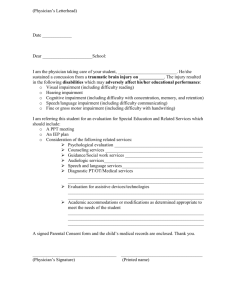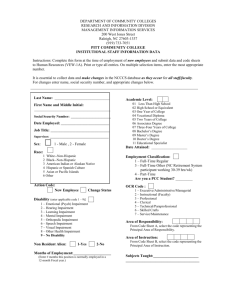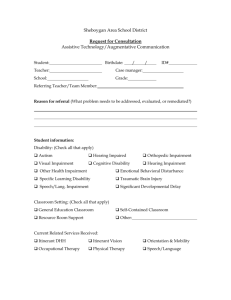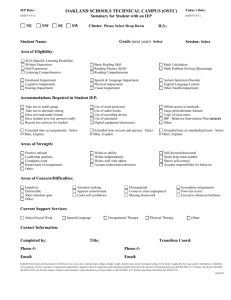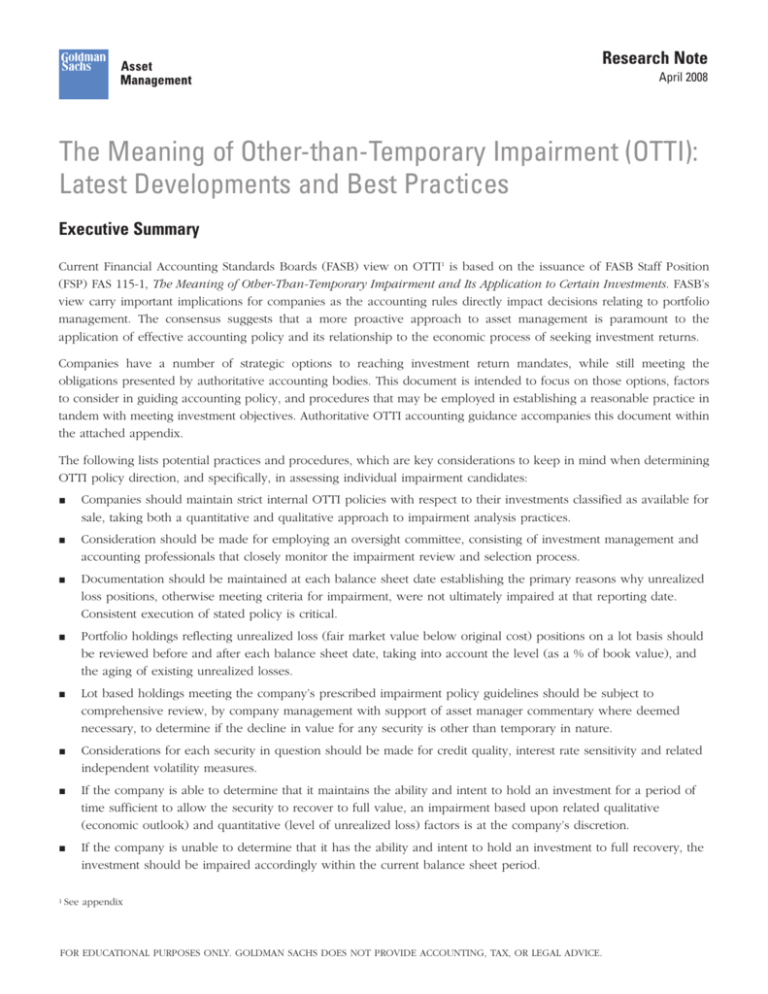
Research Note
April 2008
The Meaning of Other-than-Temporary Impairment (OTTI):
Latest Developments and Best Practices
Executive Summary
Current Financial Accounting Standards Boards (FASB) view on OTTI1 is based on the issuance of FASB Staff Position
(FSP) FAS 115-1, The Meaning of Other-Than-Temporary Impairment and Its Application to Certain Investments. FASB’s
view carry important implications for companies as the accounting rules directly impact decisions relating to portfolio
management. The consensus suggests that a more proactive approach to asset management is paramount to the
application of effective accounting policy and its relationship to the economic process of seeking investment returns.
Companies have a number of strategic options to reaching investment return mandates, while still meeting the
obligations presented by authoritative accounting bodies. This document is intended to focus on those options, factors
to consider in guiding accounting policy, and procedures that may be employed in establishing a reasonable practice in
tandem with meeting investment objectives. Authoritative OTTI accounting guidance accompanies this document within
the attached appendix.
The following lists potential practices and procedures, which are key considerations to keep in mind when determining
OTTI policy direction, and specifically, in assessing individual impairment candidates:
쐍
Companies should maintain strict internal OTTI policies with respect to their investments classified as available for
sale, taking both a quantitative and qualitative approach to impairment analysis practices.
쐍
Consideration should be made for employing an oversight committee, consisting of investment management and
accounting professionals that closely monitor the impairment review and selection process.
쐍
Documentation should be maintained at each balance sheet date establishing the primary reasons why unrealized
loss positions, otherwise meeting criteria for impairment, were not ultimately impaired at that reporting date.
Consistent execution of stated policy is critical.
쐍
Portfolio holdings reflecting unrealized loss (fair market value below original cost) positions on a lot basis should
be reviewed before and after each balance sheet date, taking into account the level (as a % of book value), and
the aging of existing unrealized losses.
쐍
Lot based holdings meeting the company’s prescribed impairment policy guidelines should be subject to
comprehensive review, by company management with support of asset manager commentary where deemed
necessary, to determine if the decline in value for any security is other than temporary in nature.
쐍
Considerations for each security in question should be made for credit quality, interest rate sensitivity and related
independent volatility measures.
쐍
If the company is able to determine that it maintains the ability and intent to hold an investment for a period of
time sufficient to allow the security to recover to full value, an impairment based upon related qualitative
(economic outlook) and quantitative (level of unrealized loss) factors is at the company’s discretion.
쐍
If the company is unable to determine that it has the ability and intent to hold an investment to full recovery, the
investment should be impaired accordingly within the current balance sheet period.
1
See appendix
FOR EDUCATIONAL PURPOSES ONLY. GOLDMAN SACHS DOES NOT PROVIDE ACCOUNTING, TAX, OR LEGAL ADVICE.
Research Notes | The Meaning of Other-than-Temporary Impairment (OTTI): Latest Developments and Best Practices
쐍
Impairment should be based on the fair market value of the security at the balance sheet date and the unrealized
loss associated with the impaired lot should be taken into earnings for the current period.
쐍
Securities in an unrealized loss position, but not impaired at the most recent balance sheet date should be
tracked throughout the subsequent quarter. Focus should be centered on previous quarter unrealized loss
positions that are subsequently sold at a realized loss.
쐍
Circumstances surrounding disposals of such securities at a realized loss in the subsequent quarter should be
well documented.
While these steps may address the procedural aspects of identifying potential impairment candidates under current
accounting rules, they do not address the earnings volatility tolerance each company must define upon recognizing their
potential income statement exposure.
Options for Appropriate Accounting Treatment of OTTI
There are several options for companies seeking direction in the appropriate accounting treatment related to OTTI.
These options are largely dependent on the company’s appetite for volatility within its earnings trends. Some options
center on the documentation and explanation supporting related sales activity, still others focus on the potential isolation
of concentrated security types that may be more susceptible to turnover. The following is representative of the options
available to industry firms seeking alternatives on how to address this developing issue.
The “sales after the balance sheet date” aspect of OTTI has become a primary focus of auditors during the course of
2007. Particularly those sales of impaired securities after the most recent balance sheet date, but before issuance of the
associated periods financial statements. Such audit focus concentrates on the trends in disposals of securities at a gross
realized loss, and the unrealized gain or loss position of the associated security lots as of the previous balance sheet
date. Those lots that are disposed of at a realized loss in the current quarter, that reflected an unrealized loss at the end
of the previous quarter, but were not impaired at that time, present conflict to the intent and ability to hold theory.
Strategies employed by the asset manager in selling securities, within the guidelines of the investment mandate
prescribed by the company, are a key element in managing the company’s intent and ability to hold to recovery. With
a growing emphasis on the guidelines presented by FAS115-1, every organization must make considerations within their
investment mandates for the occurrence of OTTI related issues. For instance, the type of strategies used, such as a total
return mandate’s “rebalancing process,” may raise the possibility that the company will be impacted by OTTI rules if
securities qualifying for impairment are impacted.
Regardless of the company’s discretion within the asset management agreement, the sale of impaired securities may be
expressly restricted in order to support the assertion that management maintains the intent and ability to hold securities
to recovery. Many of these elections lead to the need for a more proactive approach between the company and its
investment managers in analyzing the prospects of individual security disposals and creating a framework for
expectations within asset manager trading practices.
Very often it is not the company’s, nor portfolio managers’, intent to sell a security looking forward at a given point in
time. Events occurring since the previous balance sheet date, leading to the disposal of the security at a loss, may not
have been expected to occur at that time. In the absence of circumstantial developments in the current period, the
ultimate disposal of the security may not have taken place. The underlying reason for the security’s liquidation is the
primary support that distinguishes a “trend.”
2
FOR EDUCATIONAL PURPOSES ONLY. GOLDMAN SACHS DOES NOT PROVIDE ACCOUNTING, TAX, OR LEGAL ADVICE.
Research Notes | The Meaning of Other-than-Temporary Impairment (OTTI): Latest Developments and Best Practices
The following are potential accounting policy selections with respect to OTTI
쐍
Elect under FAS115 to categorize assets in impacted portfolios as trading with unrealized gains and losses
immediately recognized in income.
쐍
Elect to take impairment losses only within targeted portfolios in which turnover due to economic variables may
be more pronounced or fluctuations in fair value more volatile.
쐍
Segregate assets into further detail, isolating investments that are exposed to higher potential turnover rates or
volatility (and thereby potential impairment) within specific portfolios.
쐍
Restrict all securities in an unrealized loss position at the balance sheet date from sale (at a loss) in the
subsequent period.
쐍
Continue with current asset management practices and create a policy that addresses the concerns of the audit
community for unforeseen circumstances leading to securities sales through the documentation and support of
the underlying drivers of such sales. Consideration of the terms of investment agreements in place with individual
asset managers must be made.
쐍
Consider the sale of unrealized loss lots prior to the balance sheet date.
Organizations employing a comprehensive impairment policy will be able to provide documented audit direction
supporting the primary reasons driving securities disposals, which corroborates the assertion that the company’s intent
and ability to hold was intact at the balance sheet date but eventually affected by deviations in associated risk or other
related factors. Such documentation limits the prospects for the “tainting” of an entire portfolio and supports avoidance
of the trend of selling within a specific portfolio.
Impairment support documentation methodology should be applied systematically and consistently and include such
information as description of analytical procedures employed, timing of assessments, factors considered and prevailing
documented accounting policy. In assessing individual impairment candidates, recognition of developing market
conditions – whether qualitative or quantitative in nature – leading to sales activity resulting in realized losses is critical
to supporting the documentation effort.
No matter what the final determination, the policy that is ultimately selected by the company will most certainly have
a potential material impact on the company’s earnings volatility. The objective is to find an acceptable equilibrium
between the economic necessities of asset management and the responsibilities of operating under Generally Accepted
Accounting Principles (GAAP).
The following are questions to consider within the OTTI analysis process:
쐍
Do trades in question represent a trend of selling?
쐍
What is the materiality of the realized loss?
쐍
What documentation supports the reason for the trade?
쐍
Was the securities disposal foreseeable at the previous balance sheet date?
쐍
Did a guideline within the investment mandate require the security to be sold?
쐍
What unanticipated market development induced the decision to sell?
쐍
What was the purpose of the liquidation; favorable market conditions or a direct need for liquidity?
쐍
What cash flow projection techniques are employed by the company to assess future cash requirements?
쐍
How do cash flow projection techniques affect investment management practices?
3
FOR EDUCATIONAL PURPOSES ONLY. GOLDMAN SACHS DOES NOT PROVIDE ACCOUNTING, TAX, OR LEGAL ADVICE.
Research Notes | The Meaning of Other-than-Temporary Impairment (OTTI): Latest Developments and Best Practices
No hard and fast rules have been prescribed by the FASB for the purpose of specifically defining ‘intent and ability” to
hold a security. The FASB has developed an effective framework to allow companies to understand how impairment
determination should be approached and supported. The risk of financial filing restatement due to ineffective
impairment policy is now quite clear.
The attached appendix references accounting guidance prescribed by the primary U.S. based regulatory accounting
bodies on the issue. Ultimately, every organization is expected to evaluate its ability and intent to hold its investments
by considering a number of factors, including whether its obligations and/or its cash and working-capital requirements
indicate that the investment may need to be sold prior to recovery.
Appendix - Best Practices for OTTI
FAS 115 states that if it is probable that an institution “will be unable to collect all amounts due according to the
contractual terms of a debt security not impaired at acquisition, an other-than-temporary impairment shall be considered
to have occurred.” However, FAS 115 also refers to two other sources of literature that should be considered in
evaluating impairment:
쐍
Securities and Exchange Commission (SEC) Staff Accounting Bulletin (SAB) No. 59, Other Than Temporary
Impairment of Certain Investments in Debt and Equity Securities
쐍
American Institute of Certified Public Accountants (AICPA) Statement on Auditing Standards No. 92, Auditing
Derivative Instruments, Hedging Activities, and Investments in Securities.
Recognizing that FAS 115 provided limited guidance on evaluating impairment, the FASB staff addressed the subject in
a November 1995 FAS 115 implementation guide. In their response FASB staff advised that recognition of other-thantemporary impairment also may be required if the decline in a security's value is due to an increase in market interest
rates or a change in foreign exchange rates since acquisition. Examples of when a decline in the fair value of a debt
security may be other than temporary include situations where the security will be disposed of before it
matures or the investment is not realizable.
The FASB’s response within the implementation guide also dealt with the disposal of a security prior to maturity,
referencing EITF Topic No. D-44, Recognition of Other-Than-Temporary Impairment upon the Planned Sale of a Security
whose Cost Exceeds Fair Value (superseded by EITF 03-1-a). The EITF had discussed this issue earlier in 1995 after the
FASB staff had been asked about the accounting treatment for a “specifically identified available-for-sale debt security”
that an institution “intends to sell at a loss shortly after the balance sheet date.” The FASB staff indicated that, in this
situation, if the institution “does not expect the fair value of the security to recover prior to the expected time
of sale, a write-down for other-than-temporary impairment should be recognized in earnings in the period in
which the decision to sell is made.”
In EITF Issue No. 03-1, The Meaning of Other-Than-Temporary Impairment and Its Application to Certain Investments
the FASB requires distinguishing between securities that have had unrealized losses for periods of more than and less
than one year, however indicates that this one-year time period is not an automatic line of demarcation for inferring
when unrealized losses become other-than-temporary impairments. The SEC staff has noted that an other-thantemporary decline may also occur within a shorter period of time. This would most likely be the case if the issuer of
the security has experienced significant credit deterioration, with or without a payment default, or in the event of a
planned sale of a depreciated security.
4
FOR EDUCATIONAL PURPOSES ONLY. GOLDMAN SACHS DOES NOT PROVIDE ACCOUNTING, TAX, OR LEGAL ADVICE.
Research Notes | The Meaning of Other-than-Temporary Impairment (OTTI): Latest Developments and Best Practices
According to SAB 59, the following are “only a few examples of the factors which, individually or in combination,
indicate that a decline is other than temporary and that a write-down” to fair value is required:
쐍
The length of the time and the extent to which fair value has been less than cost;
쐍
The financial condition and near-term prospects of the issuer, including any specific events that may influence
the operations of the issuer, such as changes in technology that may impair its earnings potential or the
discontinuance of a segment of the issuer's business that may affect its future earnings potential; or
쐍
The intent and ability of the institution to retain its investment for a period of time sufficient to allow
for any anticipated recovery in fair value.
SAS No. 92 cites the following subjective and objective examples of factors associated with impairment review:
쐍
Fair value is significantly below cost and:
–
The decline is attributable to adverse conditions specifically related to the security or to specific conditions in
an industry or in a geographic area.
–
The decline has existed for an extended period of time.
–
Management does not possess both the intent and the ability to hold the security for a period of
time sufficient to allow for any anticipated recovery in fair value.
쐍
The security has been downgraded by a rating agency.
쐍
The financial condition of the issuer has deteriorated.
쐍
Dividends have been reduced or eliminated, or scheduled interest payments have not been made.
쐍
The institution recorded losses from the security subsequent to the end of the reporting period.
FSP’s FAS 115-1 and FAS 124-1, The Meaning of Other-Than-Temporary Impairment and Its Application to Certain
Investments, released in November 2005 nullified certain requirements of EITF 03-1 and superseded Topic D-44,
providing more detailed guidance on the determination of when an investment is considered impaired, whether that
impairment is other than temporary, and the measurement of an impairment loss. The FSP includes accounting
considerations subsequent to the recognition of an other-than-temporary impairment and requires certain
disclosures about unrealized losses that have not been recognized as other-than-temporary impairments.
Within FSP FAS 115-1 and 124-1 the FASB specifies various impairment indicators, and specifically within paragraph
10b.4 references “A bona fide offer to purchase (whether solicited or unsolicited), an offer by the investee to sell, or
a completed auction process for the same or similar security for an amount less than the cost of the investment” as an
“event or change in circumstances which has occurred within the period that may have a significant adverse effect on
the fair value of the investment”.
Further within FSP FAS 115-1 and 124-1, the FASB provides guidance through paragraph 14 “questions sometimes arise
about whether an investor shall recognize an other-than-temporary impairment only when it intends to sell a specifically
identified available-for-sale debt or equity security at a loss shortly after the balance sheet date. When an investor has
decided to sell an impaired available-for-sale security and the investor does not expect the fair value of the security to
fully recover prior to the expected time of sale, the security shall be deemed other-than-temporarily impaired in the
period in which the decision to sell is made. However, an investor shall recognize an impairment loss when the
impairment is deemed other-than-temporary even if a decision to sell has not been made.”
5
FOR EDUCATIONAL PURPOSES ONLY. GOLDMAN SACHS DOES NOT PROVIDE ACCOUNTING, TAX, OR LEGAL ADVICE.
Research Notes | The Meaning of Other-than-Temporary Impairment (OTTI): Latest Developments and Best Practices
General Disclosures
This material is provided for educational purposes only and should not be construed as investment advice or an offer or solicitation to buy or sell
securities.
Goldman Sachs does not provide accounting, tax, or legal advice. Notwithstanding anything in this document to the contrary, and except as required
to enable compliance with applicable securities law, you may disclose to any person the US federal and state income tax treatment and tax structure
of the transaction and all materials of any kind (including tax opinions and other tax analyses) that are provided to you relating to such tax treatment
and tax structure, without Goldman Sachs imposing any limitation of any kind. Investors should be aware that a determination of the tax consequences
to them should take into account their specific circumstances and that the tax law is subject to change in the future or retroactively and investors are
strongly urged to consult with their own tax advisor regarding any potential strategy, investment or transaction.
IRS Circular 230 Disclosure: Goldman Sachs does not provide legal, tax or accounting advice. Any statement contained in this communication
(including any attachments) concerning U.S. tax matters is not intended or written to be used, and cannot be used, for the purpose of avoiding
penalties imposed on the relevant taxpayer. Clients of Goldman Sachs should obtain their own independent tax advice based on their particular
circumstances.
Opinions expressed are current opinions as of the date appearing in this material only. No part of this material may, without GSAM’s prior written
consent, be (i) copied, photocopied or duplicated in any form, by any means, or (ii) distributed to any person that is not an employee, officer, director,
or authorized agent of the recipient.
Copyright © 2008, Goldman, Sachs & Co. All Rights Reserved.
7788.OTHER / 04-08
6
FOR EDUCATIONAL PURPOSES ONLY. GOLDMAN SACHS DOES NOT PROVIDE ACCOUNTING, TAX, OR LEGAL ADVICE.


